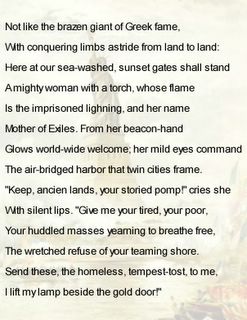From the pedestal of the Statue of Liberty
The ever-eloquent Billmon captures my feelings with this powerful essay. Definitely worth reading the whole thing. Here's your snip:
I'm not a big fan of patriotism, at least not as most Americans understand the word. Patriotism is just another word for nationalism, and nationalism in my book is the modern equivalent of the black plague -- an incubator of xenophobia at its least, a killer of millions at its absolute worst. And we've seen enough of the absolute worst over the past century to understand where nationalism could ultimately lead: the extinction of the entire human race.
Still, there are emotional attachments to home -- to the familiar, the dear, the remembered -- that go deeper than the intellect and pull harder than reason. Tribal loyalty is a powerful thing. On the morning of 9/11, I was as much a patriot as any man or woman alive, and would have greedily torn Bin Ladin to pieces with my own hands to avenge "our" dead.
But hatred and revenge are patriotism's curse, not its justification. When Lincoln spoke of "mystic cords of memory" and urged his countrymen to put their common heritage ahead of their political divisions, he wasn't appealing to their tribal loyalties, but their loyalty to an ideal: democratic government under the law. If American patriotism has any claim to be an exception to the general run of blind national chauvinism, it has to be found in that idea. If America is to be an exceptional nation, one worth glorifying above all others, it has to be because of the quality of her justice and the strength of her democracy -- not because of the language she speaks, or the God she worships or the color of her skin. And not because of her material wealth or military power or imperial ambitions. Least of all those.
Pat Buchanan and I agree on very few things, but he wrote something many years ago that I can endorse wholeheartedly: "America was a great country before she was a rich country." In many ways a greater country, I would probably add -- not because she was poor (if you've seen real poverty, Third World poverty, you know there's nothing to admire about it) but because she stood a little less apart from the rest of humanity, and had to rely a little more heavily on the promises inscribed on the Statue of Liberty, rather than power of her aircraft carriers, to impress the world.
What I saw in Jimmy John's hot dog stand was the ghost of an America I used to know -- a land of little guys looking for a place to build something. Of strong unions and good-paying jobs that didn't require a PhD. Of black and white televisions where you could watch the cheesiest ads imaginable. Of corner drug stores and transistor radios and long evenings spent sitting on the front porch, talking to the neighbors.


|